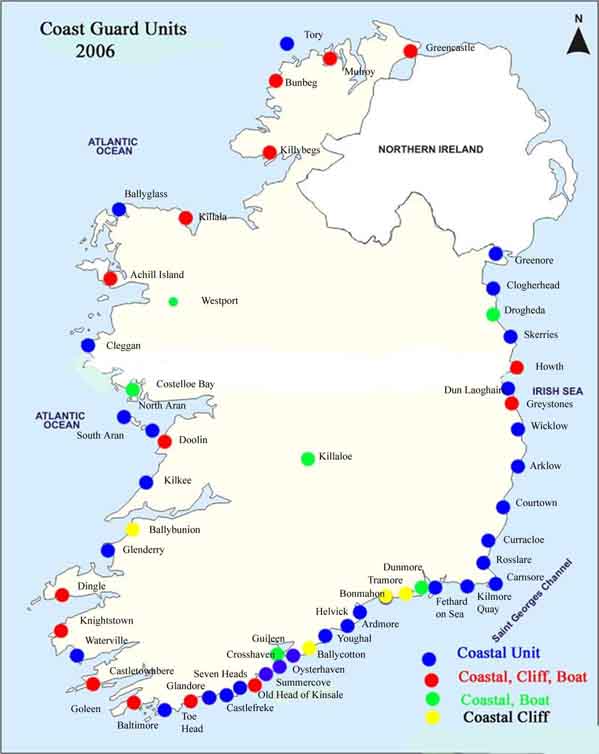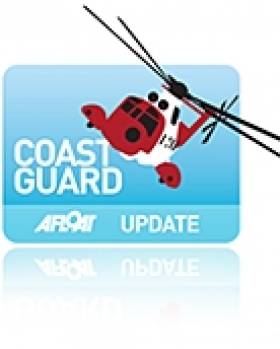Displaying items by tag: Guard
Coast Guard Urges Public Not to Go Out on Exposed Piers
The Irish Coast Guard service today issued an important warning to the public about high winds, gales and flooded areas. This warning comes following a weather warning and a strong gale warning issued by Met Eireann today. Southwest winds veering westerly will strengthen during this afternoon with stormy conditions becoming widespread.
Speaking today, Chris Reynolds Director of the Coast Guard said: "The public is strongly advised not to go out on exposed coasts, cliffs, piers, harbour walls, beaches, promenades or any other coastal areas. The principal dangers from this weather system will be due to gusts of 100 to 140 km/hr expected with the most severe in exposed parts of Ulster and Connacht. Showers will be heavy and thundery at times merging to give longer spells of rain in the north. Highest temperatures 9 to 11 degrees. Huge waves can be whipped up by high seas. These waves can pose hazards to anyone close to the shoreline. In coastal waters, rough seas are often the cause for capsizing fishing vessels. Some of these accidents can take place so quickly that there is no time for the crew to send out distress signals."
He continued: "Do not attempt to cross at fast running river or flood water fords as they may be stronger and deeper than you think. Flooded urban areas may contain many hazards, not least of which include submerged open manholes and downed power lines. The combination of tides, forecasted gale warnings for the next day or so, high sea conditions and swollen rivers may result in very dangerous conditions. Remember to monitor weather broadcasts when travelling and heed the advice of the RSA on road use during severe weather and high winds ."
Specific advice from the Coast Guard today is:
· Stay away from the shoreline and do not engage in water sports;
· Owners of small vessels and fishing vessels in coastal waters should seek shelterand secure them properly with moorings;
· Ships in the open sea should take heeds of weather forecasts and warnings and avoid the sea area with the most treacherous conditions.
Mr. Reynolds ended by saying: "If you do see someone in difficulty in the sea, on the shore, cliffs, lakes or rivers dial 999 or 112 and ask for the Coast Guard. "
The Irish Coast Guard (IRCG) (Garda Cósta na hÉireann) is part of the Department of Transport.
All the latest Irish Coast Guard news is here.
The Irish Search and Rescue Region, which includes most of the Republic of Ireland and parts of Northern Ireland, is the area over which the coast guard has authority. This area is bounded by the UK Search and Rescue Region.
The Coast Guard is responsible for:
– Search and Rescue
– Marine communications network
– Marine safety awareness
– Mountain and Cave Rescue
Pollution and Salvage response in the marine environment (the Marine Rescue Co-ordination Centre [MRCC] in Dublin coordinates all pollution and salvage control in the Irish Exclusive Economic Zone [EEZ]).

Note that not all Irish Coast Guards have enforcement powers – only some officers under warrant.
The Coast Guard (Garda Cósta) does not form part of the Irish Defence Forces, rather it operates as an agency of the Department of Transport under the Maritime Safety Directorate. The Maritime Safety Directorate comprises two main sections, the Maritime Safety and Marine Environment Division (MSED) and the Marine Survey Office (MSO). The Marine Survey Office also includes the Marine Radio Affairs Unit (MRAU). The Mercantile Marine Office (MMO) also works under the Directorate.
- The Maritime Safety and Marine Environment Division is responsible for maritime safety, security policy and legislation (including leisure safety), aids to navigation and corporate governance of the Commissioners of Irish Lights and marine environment protection issues.
- The Marine Survey Office deals with the inspection, survey, certification and licensing of vessels and vessels radio equipment; the examination and certification of seafarers competencies; enforcement of standards by way of audits on organisation and facilities and prosecutions for breaches of regulations.
While in some jurisdictions they are the responsibility of the Coast Guard, in Ireland, fisheries patrols are carried out by the Navy and drug smuggling patrols by Customs, the Gardaí and the Navy. However, all the above government services can at any time request assistance from each other when needed.
(The above information and image courtesy of Irish Coast Guard)
Irish Coast Guard, MRCC Dublin, Coast Guard Headquarters, Department of Transport, Leeson Lane, Dublin 2. Tel: 01 678 2303, Fax: 01 678 3459
























































